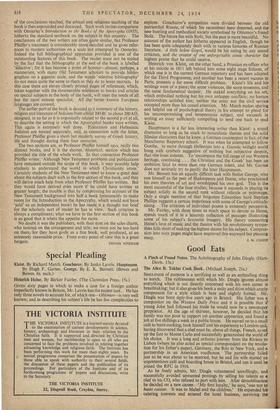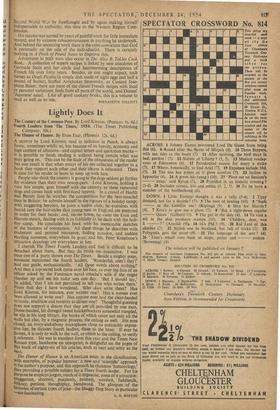Good Eats
A Pinch of Pound Notes. The Autobiography of John Dingle. (Hart- Davis. 15s.) The Alice B. Toklas Cook Book. (Michael Joseph. 21s.) SINGLENESS of purpose is a terrifying as well as an enthralling thing to watch. The ruthlessness with which Mr. Dingle ignores almost everything which is not directly concerned with his own career is breathtaking; but it also gives his book a unity and drive which amply compensate for a style which is bare and slightly formal. Mr. Dingle was born sixty-five years ago in Bristol. His father was a compositor on the Western Daily Press and it is possible that if young John had followed his trade he would now be a newspaper proprietor. At the age of thirteen, however, he decided that his family was too poor to support yet another apprentice, and found a job at five shillings a week in a public house. He moved on to a small café to learn cooking, took himself and his experienbe to London and, having discovered that a chef must be, above all things, French, saved up the fare to Monte Carlo and successfully gatecrashed the world of his choice. It was a long and arduous journey from the Riviera to Lisbon (where he also acted as special correspondent on the revolu- tion for his father's paper), Germany, the Ritz in New York, and a partnership in an American roadhouse. The partnership failed just as he was about to be married, but he and his wife started an unpretentious cafe and boarding house in Bristol, and ran it until he joined the RFC in 1916.
As he freely admits, Mr. Dingle volunteered unwillingly, and successfully avoided unwanted postings by selling his talents as a chef to his CO, who refused to part with him. After demobilisation he decided on a new career. 'My first loyalty,' he says, 'was not to haute cuisine. It was to Mabel and the children.' He expanded his catering interests and entered the hotel business, surviving the
Sc.zpild World War by forethought and by again making himself Indispensable to authority, this time to the Western Region Com- mission.
His success was earned by years of painful work for little immediate reward, and by extreme conscientiousness in anything he undertook. And behind the unceasing work there is the calm conviction that God is personally on the side of the individualist. There is certainly nothing in A Pinch of Pound Notes to disprove this.
Adventures in both wars also occur in The Alice B. Toklas Cook Book. A collection of superb recipes is linked by new anecdotes of Gertrude Stein and her circle and heartwarming descriptions of French life over forty years. Besides, as one might expect, such names as Oeufs. Picabia (a simple dish made of eight eggs and half a Pound of butter), Stuffed Artichokes Stravinsky, or Custard Jose- phine Baker, there are most of the classic French recipes with local or personal variations, finds from all parts of the world, and Dumas' 'Japanese' salad. Like all good cookery books, this is a volume to



























 Previous page
Previous page